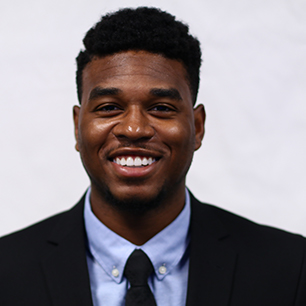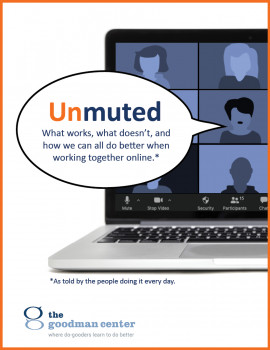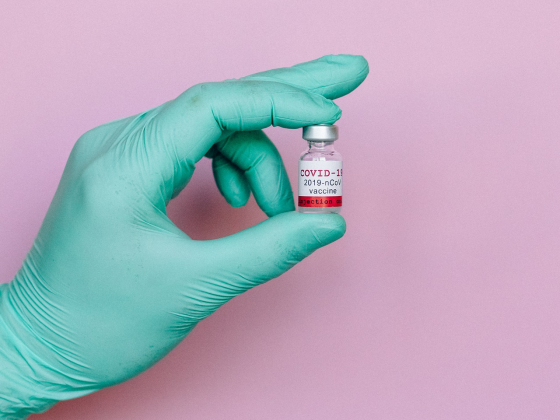Ja’kari Clayton is set to graduate from UF with a MA in Mass Communications and become the “first ever” graduate specializing in public interest communications. He’s also spent the last two years as a research assistant with the Center. The Center’s Postdoc, Jack J. Barry, interviewed Ja’kari to get his thoughts on the program, which skills he learned in the program that he found to be most valuable, and to get a glimpse into what his bright future holds.
What attracted you to the field of public interest communications? And specifically what led you to choosing to complete the MA?
Ja’kari: My journey into public interest communications I find to be fascinating. It started back in 2018 when I was in the journalism pro-Masters track at UF. On the pro-masters track I knew journalism was something that I always wanted to get into because I’ve always loved writing and I’ve always loved helping people. My introduction into the pro-masters was great. I don’t want to take anything away from it. I learned a lot of skills that I think I can use in the future, whether it’s video editing or learning how to operate a camera or just learning how to tell my story and use that as a way to get certain messages out there. I was going into my first spring semester and my advisor and I were just talking about programs and how the pro-masters was going. And I told her I felt like something was missing. She asked me what it was that I really wanted to focus on. I said I really wanted to make a difference in various communities that I serve, and I wanted to be this vessel to create change, not just on a small scale pro-bono, but on a much bigger scale. And she introduced me to the public interest communications specialization and then from there it’s kind of just been a whirlwind, I got in contact with Ellen Nodine, the Director of Training at the Center for Public Interest Communications.
I think what really sold me on the specialization was this idea that creating sustainable change cannot be done simply by raising awareness, but instead it is through intentional actions. I think once I really understood that, that’s when I knew that this was the right program for me. I knew a master’s degree was what I wanted because in undergrad at Florida International I felt like a passer by and that I was getting an education, but it was kind of just a means to the end, it’s like an accomplishment to tick off. But with the master’s, it was something that I was able to hone in on and focus and grow by going through the full grind and really appreciating it as it happened. Because this was something that I was really interested in, something that I wanted to continue doing in the future. So I felt like a master’s degree was the next best option for that.
What have been some of the highlights of your time in the program? What has fascinated you about things you learned about the field? What skills and tools did you learn about that you think you will be with you forever?
Ja’kari: Honestly, there have been so many. Learning how to use my story as a weapon for change. To go into communities, assimilate, and be able to hone in, and focus on areas for improvement is a highlight. In the program I learned what it means to create sustainable change. When I think about sustainable change, I think about a blueprint for change and involving the community in decision making about that blueprint–the program has helped me be able to focus my learning on these important elements for social change.
Another highlight was learning how to get away from simply raising awareness and get more into strategic communications, especially how to target specific networks, and to be more detail oriented in one’s approach. To really hone in on people who are affected by an issue. The program taught me how to engage with communities, listen, and get involved. Yes, it was research focused, but at the same time it is people focused–done through listening to people about issues that are affecting them, and designing with their needs in mind. Another way of putting it is even though this field is research based, it is human driven.
And I think that’s really important because I think sometimes we as people, or as academics, hide behind data, we hide behind facts, we hide behind numbers, but when you go into the community, and you just spew those facts, those numbers, those variables, chances are the target network does not really care. They just want to understand how you can help to uplift them through effectively eliminating an issue together.
Some of the skills and tools I learned will certainly be with me forever, and it would be a crime if I did not mention research first–which I find to be most important. Also, another skill I learned was how to create campaigns and to be intentionally empathetic. The goal should not be to feel sorry for communities or groups, but to understand the issues facing them by getting their perspective on what is the problem so you can effectively help them in the way that they need and want to be helped.
Now that you are about to graduate what are your plans for the near term and long term? In what ways do you think this degree will contribute to your future career?
Ja’kari: In the near term I would like to work for a non-profit that is tuned into specific social justice issues. Specifically working on campaigns focused on social justices issues and targeting networks to overcome obstacles. In the long term I would be interested in work with the state government, and possibly the federal government. In particular, to help the government truly understand social justice issues and better utilize networks that create change. Now there’s a disconnect as governments are basing their strategy about what they think will work for individuals instead of truly understanding the perspective of the target network that they’re trying to impact. So my longer term goal is to help changemakers, policymakers, and especially to help governments understand what it really takes to join these communities and create the policies and initiatives and goals that the communities need and want.
Getting this degree has shown me what it is really like to be a communicator. How to be an effective changemaker, a planner, being able to be empathic, set tangible goals,and how to disseminate strategic messages into a community.
Anything else you would like to say about your time in this program and at UF? Any shout outs?
I have truly enjoyed my time here. First and foremost I would like to thank all those working at the Center for Public Interest Communications, Ann Searight Christiano, Ellen Nodine, Annie Niemand, Matt Sheehan, Jack Barry, Brendan Martin, Lissette Tolentino, and Rakeem Robinson. I was just a kid who didn’t really have a lot of research experience or didn’t really know how to analyze things and you all took me under your wing and allowed me to not only turn into a master’s student, but to effectively turn into a research assistant, someone who can analyze an article and understand it in various communities and see if the results are the results that I intended. So, I’d like to say thank you. First and foremost, to all of you.
Also, I would like to thank my mom Tamara, grandmother Rosa, and Auntie Kris. I am honored and indebted to all of you.



